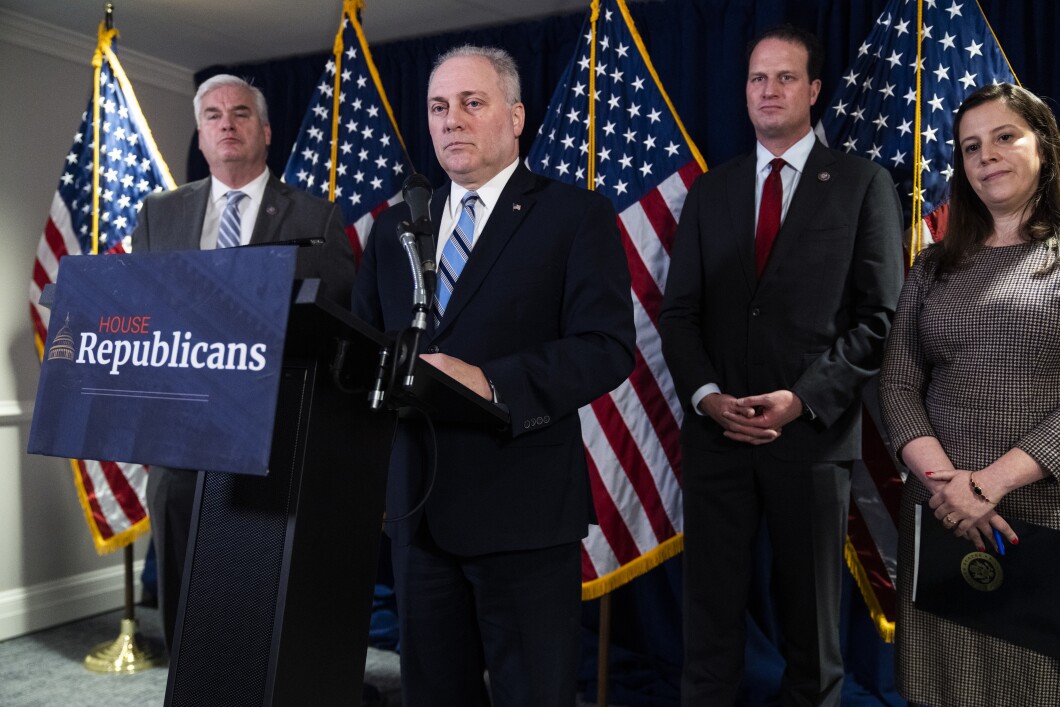
House Republicans need to prove they can govern now that they have taken back control of the chamber, says House Majority Leader Steve Scalise (R-LA).
Scalise, now second in House Republican leadership behind Speaker Kevin McCarthy (R-CA), believes GOP lawmakers, who hold a 222-213 edge over Democrats, can tackle large portions of their agenda despite the challenges of holding a narrow majority.
The affable Louisianan has a long record in House Republican leadership. He was majority whip for 4 1/2 years under GOP Speakers John Boehner and Paul Ryan. Scalise then was the minority whip when House Democrats held the majority from 2019-2023.
Scalise told the Washington Examiner he is no stranger to overcoming challenges. He survived and recovered from near-fatal injuries after being shot while practicing for the annual Congressional Baseball Game on June 14, 2017. The experience has driven home his philosophy that you need to “make every day count.”

“God gave me a second chance on life,” Scalise said. “It easily could have gone a different way that day, and I know how close I was to not making it out.”
On that warm late spring day, at 7:09 a.m., Scalise and three other people were shot and wounded by James Hodgkinson, a left-wing extremist with a record of domestic violence. Hodgkinson opened fire with a rifle during the congressional Republican baseball practice in Alexandria, Virginia.
After a series of surgeries and going in and out of an intensive care unit of a Washington, D.C., hospital, Scalise was discharged on July 26. He then went through a period of inpatient rehabilitation.
“I saw real miracles that day and not just for me, but for other people that made it through that day as well,” Scalise said. “I was in a hospital for 3 1/2 months and, once I got beyond wondering if I was going to make it through the next day, and then I had to plan on learning how to walk again. When I can actually start thinking about what I wanted to do when I got out of the hospital, there was never a doubt I want to go back to work.”
House majority leader duties
In his new position as majority leader, Scalise is tasked with leading efforts on scheduling what will be considered on the floor. He hopes that recent changes to House and conference rules aimed at expanding floor consideration of bills and the ability to offer amendments will help different factions of the party unite and come together on major bills.
“The schedule is always busy in Congress, but once you get into leadership, there are a lot more meetings that are focused on shaping the agenda and making sure we can carry out the agenda. Especially going from the minority to the majority, we actually can control the House floor. We can bring bills through committee. We can address the problems that we’ve been trying to deal with,” Scalise said.
“So, there’s more responsibility. But it’s a lot more exciting because you want to be able to go and address the problems that you ran on,” said Scalise, who first won his New Orleans suburbs seat in an April 2008 special election. Scalise previously spent 12 years in the Louisiana legislature as a member of both chambers. At Louisiana State University, Scalise majored in computer science with a minor in political science.
Now that he’s charged with helping run the House’s day-to-day operations, Scalise said it’s important Republicans do away with procedures established during the COVID-19 pandemic that were kept in place too long, such as proxy voting. Members should have to be present in Washington when voting, he said, talking it up as a move that could help bipartisanship in Congress.
“I think that was one of the things that broke down the institution because people weren’t talking to each other,” he said. “When you’re remote, you’re just not having the same kind of conversations and confronting the same challenges that you can when you’re a person. It forces everybody together to solve these problems.”
Scalise said he’s encouraged that within the first couple of weeks, there have already been some bills that have passed with broad bipartisan support.
Still, not everything has run as planned by Republicans in the narrowly divided House.
On Dec. 30, days before the start of the new Congress, incoming Majority Leader Scalise promised that the House Republicans would “hit the ground running to do what we promised on the border, crime, energy, inflation, Life, taxpayer protection & more.” In a letter to lawmakers, Scalise outlined 11 bills the party would bring to the floor in the first two weeks of the new Congress.
But by the end of January, only about half had been voted on. Some got votes later in January, and into the first half of February. While others weren’t on the calendar.
Even bills that do make it out of the House face dim prospects of becoming law, with President Joe Biden and the Senate Democratic majority pledging to block many of the proposals.
Scalise said that the GOP is hoping to prove itself during this Congress. But he hopes the 2024 election cycle will help grow the Republican majority.
“Obviously, in 2024,” Scalise said, “it’s a presidential election, but for the next two years, we’ll be passing bills to confront real problems. I’d like to see them all get signed into law, but if they don’t, I think that also helps shape the debate for 2024 to show the country that President Biden is the one standing in a way of lowering your energy costs and lowering your grocery prices and other inflation challenges that families are facing.”







